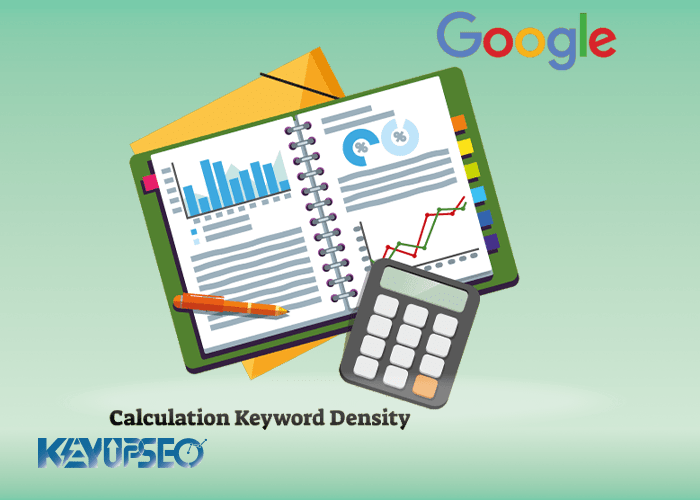
Keyword Density calculation guide
Keywords are an important part of the site's SEO strategy, and calculating the density of keywords is one of the most effective SEO tasks.
Ranking the right keywords relevant content, and optimal website design will help your site stand out from the competition in Google results and move closer to the top of the search engine results (SERP). So it's no surprise that a significant number of SEO consultants stress keywords and do keyword density research.
Focusing on the key phrases used on the page ensures that the content we create has the right relevance and meaning.
In this article from the Keyupseo blog, we examine the basic principles of Keyword Density calculation and the reason why density is important.
We'll also provide practical formulas and simple tools that can make sure your keyword strategies are working for your SEO goals.
What is keyword density?
Keyword density, also called keyword density, shows the number of times a specific keyword appears on a site page compared to the total number of words.
This number is generally determined as a percentage or ratio. The higher the word count, the more your chosen keyword should appear on the target page.
For example, if you have used the target keyword 7 or 8 times in one page of your website content that is 1000 words, you cannot use the same strategy in 2000-word content. Keyword density is significantly related to the number of words you generate on the page.
Why is keyword density important?
Keywords direct users to the site. When users search for products or services, they use different keywords. These terms show their general purpose and search engines show the results related to their search.
Currently, search engines like Google now consider factors such as geographic region and domain authority, and many more to rank results.
Part of them is defined by the number of visitors to your web page and part by "dofollow" links from reputable sites that have linked to your page.
Keywords are still important and are considered one of the success factors of websites.
There are many ways for website SEO, one of these methods is Buy Website Traffic from Keyupseo.
Is high keyword density good for SEO?
In the past, when search engines were not as advanced as they are today, websites did not pay much attention to content and filled the target page with irrelevant keywords and tags.
It was no surprise that anyone visiting these sites was not getting the results they were looking for. Search engines have come to the conclusion that better ways are needed to change their ranking criteria.
Currently, stuffing content from keywords yields photo results. Search engines penalize the pages of the site where keywords are filled or the density of keywords on that page is higher than usual and will not be included in the rankings.

Numerical calculation and keyword density formula
How do you calculate keyword density? There is a simple formula for this; Divide the number of times the keyword is used on the page by the total number of words on the page.
For example, your page has 1000 words and your keyword is used 10 times.
10/1000 = .001
Multiply the number obtained by 100 to get a percentage, which in this example is 1%. There is another formula that is sometimes used to evaluate keyword usage.
TF-IDF: stands for Sitewide Keyword Frequency and what it does is evaluate the frequency of a keyword on specific pages (TF) against the number of times the same specific keyword appears on multiple pages of your site. (IDF) is
The result of this calculation will help you calculate the size of the keyword for your specific pages and place them more precisely in the body of your content.
Find the optimal keyword density for your content
Although there is no written rule for keyword density; there are many ways to understand this.
Many SEO experts recommend using your target keyword roughly once every 200 words. Your content may perform well or poorly with more or fewer keywords, but one thing that all SEO and content professionals believe is that Google and other search engines prefer a keyword density of around 0.5%. They give a good answer.
It is also necessary to get the value of various keywords related to your business. Words and phrases that are similar to your main keyword and are considered to be part of your keywords, which are of particular importance in the site's keyword strategy.
Not sure what keyword works best for your content? There are many ways to find your main keywords or phrases close to them, But one of the best places to find these words is at the bottom of the Google results pages. Generally, it brings suggestions to the user, but if the search is long, the options are probably limited or there are no options. These are the closest searches to your keyword.
Keyword density calculation tools
You can get phrase density by calculating the total number of keywords and keywords on each page of your website. But there is an easier way to do this. You can use different tools for this.
Using tools can help you save a lot of time because you don't have to spend time manually calculating expressions. Keyword density calculators help simplify your keyword research. These tools include:

1- SEO Review Tools Keyword Density Checker
This free tool is browser-based; In fact, this site works in such a way that you simply enter the URL of your site or the text of your page.
Then it ticks the "I'm not a robot" captcha to check the keyword density and finally calculates for you how many keywords there are in your text.
Although this tool doesn't perform a very extensive analysis of your site, it's a great way to get an overview of your site's current keyword density.
2- WordPress SEO Post Optimizer
If you want to choose a WordPress plugin to evaluate keyword density, consider WordPress SEO Post Optimizer. This tool comes with a cost of $19; But it checks many search engine terms and rules, including keyword density, to ensure your content can rank high on the results pages.
3- WPMUDEV SmartCrawl
WPMUDEV SmartCrawl is another WordPress plugin that is free for seven days and costs $5 per month. In addition to evaluating the density of keywords, this tool provides search engine reports, evaluation of your titles and contents, along with an in-depth and detailed review of the site.








